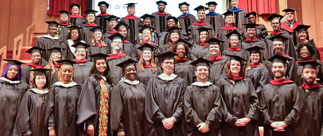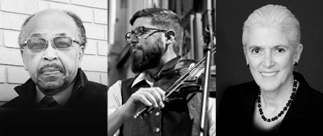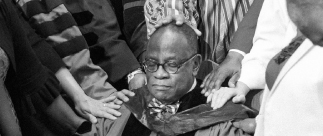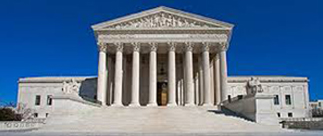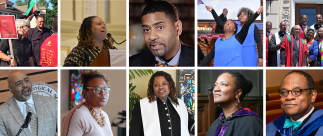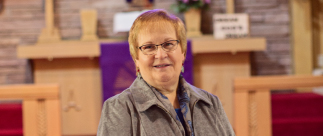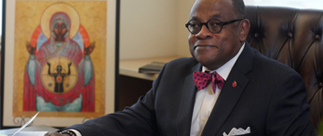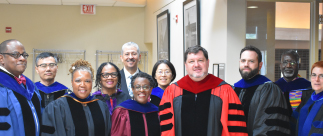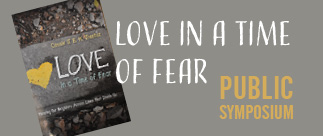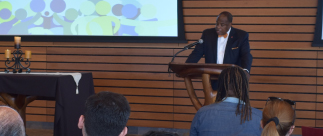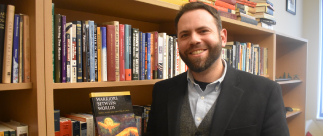The Bible: the Perfect Primer on Immigration Law for Senator Sessions
by Rev. Craig B. Mousin, MDiv 1987; CTS Life Trustee
The beauty of the United States’ First Amendment religious liberty protections stems from prohibiting laws established by religion while permitting individuals to exercise their personal faith through a spirit of discernment to pursue policies and laws for the common good. We have witnessed some of our nation’s finest moments initially inspired by persons of faith injecting that spirit into the body politic, from abolishing slavery, building hospitals, and securing civil rights. Senator Jeff Sessions, nominee for U.S. Attorney General, frequently witnesses his faith in public life. His website proclaims his belief in God as one of his four life pillars. He relies on Scripture to restrict immigration, citing Nehemiah’s wall around Jerusalem as the equivalent to building a wall at our borders excluding the unwanted. Sessions asserts that Scripture supports restricting immigration and increasing deportation of those the law bans.
But what would Senator Sessions advocate if his Bible was not available to guide his decisions? I suggest a simple thought experiment. What if the immigration law that he has so energetically advocated held force during biblical times? What if the biblical protagonists were subject to these civil and criminal restrictions? Some might be barred and others deported from the land prior to engaging in the activity that then became part of not only the biblical narrative, but western culture. We do not have to read far into Genesis before the experiment reveals results. Cain, a murderer, would be deported as an aggravated felon. Noah, a smuggler, might receive an exemption for his wife and sons, but he, too, is deported for smuggling his daughter-in-laws. Genesis reports that Pharaoh deported Abraham and Sarah for marriage fraud, a serious immigration violation that would remove them from the story and preclude their role as ancestors of those in the biblical narrative. Joseph, imprisoned for two years for attempted rape, would not be the subject of the feel-good story of a coat of many colors, but rather deported as a criminal felon. His brothers, the founders of the twelve tribes of Israel, would never fill that role for they became aggravated felons by trafficking their brother to Egypt. Even innocent Ruth, widowed, would be deported as a public charge, because gleaning in the fields proves her poverty, a sufficient ground for deportation. God forgives murderers in the Bible, calling Moses and David to leadership, but our immigration law does not forgive easily, barring them entry, thus eliminating their inspiration from the biblical canon. The one Christians call without sin, Jesus of Nazareth, sadly has more immigration violations than most.
His family fled Herod’s persecution before the family could be registered in Bethlehem. As a refugee in Egypt, how would Jesus prove his birth status permitting him to return to Nazareth? How would Joseph prove he was the biological father to the baby he was bringing back with a minor woman without papers? Joseph, guilty of trafficking underage women and children, would find himself barred at the border. Mary and Jesus would be detained, much like the thousands of women and children currently in the private detention centers in Arizona and Texas. Even if Jesus somehow made entry, additional violations plague him. The Bible regales the extravagant hospitality of Jesus in feeding the thousands with a few loaves of bread and fish. The Bible fails to tell us that Rome considered Galileans terrorists. Immigration law designates Jesus’ act of kindness as providing material aid to terrorists, making him deportable. He is later found guilty of sedition, leading to his execution. In this scenario, that conviction subjects him to deportation as an aggravated felon. His co-conspirators, the disciples, would also be deported and unable to evangelize the Gospel message. Peter would be guilty of another aggravated felony in striking the servant in the Garden of Gethsemane, preventing him from leading the church forward. Finally, one might put hope in Paul to reclaim the story. Recall, however, Paul was a persecutor of the early church, thus making him deportable and unable to carry the word to the rest of the world. Taken as a group, the Bible’s heroines and heroes provide an almost perfect primer cataloguing the many grounds of deportation and exclusion our government employs each day to remove individuals from our nation. Strictly enforcing our immigration laws would deprive the world of any biblical narrative for personal faith or for its contributions to law and morality for the last two thousand years. Deporting or excluding all the major protagonists of the Bible would leave Senator Sessions without one pillar of his life, as no Bible story would exist to guide him. God’s forgiveness and mercy repeat constantly throughout the text including the forgiveness of immigrants. Indeed, scholar Walter Brueggemann finds the biblical core of faith within a matrix of exile.[1] It is within that core of faith that God tells us not only to love our neighbor and to love God, but to love the immigrant.
The issue is not building Nehemiah’s wall; it is how we engage the encounter when one comes to us as an immigrant. God has called many: Abraham, Sarah, Moses, Ruth, Joseph, Mary and Jesus, and the others who engaged in activities that would make them deportable under our immigration laws, to teach us what it means to live our faith as if in exile. How many gifts of the immigrant do we deny ourselves today with our deportation and detention policies and practice? Congress has scheduled Senator Sessions to testify regarding his nomination on January 10 and 11. In the Christian liturgical year, Epiphany falls on January 6, when the three immigrants from the East, the Magi visited the Christ-child. Their report of the birth incited Herod to persecute the innocents in Bethlehem, forcing the family to flee to Egypt as refugees. The serendipitous timing poses this question: how would Senator Sessions respond when Jesus, Mary and Joseph, refugees without papers, seek entry?
Rev. Craig B. Mousin is a 1987 graduate of Chicago Theological Seminary and a CTS Life Trustee. He is a member of Wellington Avenue United Church of Christ. The opinions expressed in this blog are the author’s alone and do not represent those of Chicago Theological Seminary or Wellington Avenue United Church of Christ. Rev. Mousin is the author of “You Were Told to Love the Immigrant, But What if the Story Never Happened? Hospitality and United States Immigration Law” upon which this posting is based and which provides greater detail on the immigration violations discussed above:


